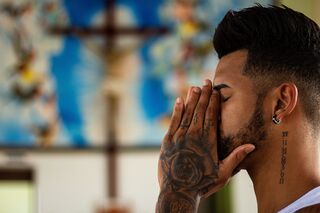Sex
Sexuality's Most Mysterious Need
Sexual Needs: Part 11
Posted June 16, 2020 Reviewed by Matt Huston

The group became speechless when he exploded out of his chair at our weekly session. Extending his finger like a prophet from the Old Testament, he stepped forward to make sure I got the point as his voice rang out, "You do not bring God into the bedroom!"
The other men in his group were stunned and even the atheists wondered aloud, "If there's a God, how would you keep him out?" I nodded my head smiling at my client, because what else was there to say? Today was not his day to begin integrating his sexuality with his spirituality.
When my clients are presented with the challenge of integrating these two parts of their lives, they're invariably confused. It's as if the religious part of their brains had never said "Hi!" to the sexual part. The atheists often earnestly protest, "But I don't have any religious beliefs." For them, it's news that spirituality is a far vaster topic than religion, predating religion. For my religious clients, their notion of "integration" shrinks down to no more than a mere recitation of their beliefs, which, when it comes to sexuality, is never more than a series of rules. Don't have sex before marriage, don't have sex outside of marriage, don't have sex with same-sex partners, don't touch yourself and for God's sake, get away from those farm animals!
Spirituality deals with the invisible, immaterial world as opposed to the physical one. Spirituality tries to answer questions like, "What is the meaning of life?" or "Why am I here?" or "How should I live?" or "What is love?" Spirituality provides meaning and context to our lives—including our sex lives. And, going once more into a very politically incorrect zone, some forms of spirituality do a better job than others when it comes to illumination and guidance to human sexual relations. When it comes to sexuality, a whole lot of spirituality is useless at best and, at worst, horribly misleading and abusive.
But is integrating sexuality and spirituality a human need? Do we need to do this? Revisiting our thought experiment from my textbook on sexual needs, We're All Like This, try to see if you can imagine the perfect sex life; perfect in every way. Now imagine that very same perfect sex life stripped of all meaning, context, and depth—is it still perfect?
Of course not. A sex life entirely limited to the physical will inevitably become boring as it depends on the two dimensions of titillation, the same song over and over again. At some point, we're ready to move on.
Spirituality is not a domain solely owned and operated by religion. We are born spiritual beings and we have concomitant spiritual needs to have meaning, to have purpose, and to see the bigger picture of contextualizing even our most intimate moments, maybe especially those intimate moments.

Here's one scary example of what happens when we fail to integrate sexuality and spirituality: His parents told him that if he was a Christian he couldn't be gay and that if he was gay he couldn't be a Christian. Since he knew as a kid that he was a Christian, he concluded that he must not be gay. Then puberty hit and his affection for males took on a more interesting meaning somewhere south of his own equator. It was OK, he thought, because he knew he'd grow out of it. Maybe once he'd married. Maybe after becoming a father. You already know the rest of the story because, of course, we never grow out of who we are. He was a straight, married, church-going man right up until he wasn't. The explanation from his religion? He'd made a bad lifestyle decision.
Some versions of religion keep their “Thou Shalt Nots” simple and to the point and some like to add a little humor, like: "Don't drink, smoke, or chew or go with girls who do." So, if I marry a girl from church, it should all work out, right? Right up till it doesn't. The problem is that both spirituality and religion are much more than a set of rules. But, when it comes to sex, churches aren't a good place to go for sexual information. Instead, consider going within.
Each one of us needs to discover the vast territory of our own sexuality because, like it or not, we are what we are. The rules say don't touch myself? Great, but explain to me how I'm to get my normal developmental sexual needs met in the next decade of my life as a singleton. I need to get to the point where I'm no longer letting my spirituality write checks that my body can't cash.
Likewise, I need to get to understand my own personal spirituality. What are my personal values? (Hint: Your values are what you value—you don't need someone else to tell you what your values are because you and you alone can know what they are. Some of us value safety above fun. Some of us are wired differently. Some of us value meaning and need to know why; some of us value experiences more than self-reflection. None of us are better than the other. We're just different.)
Integrating sexuality with spirituality is a truly solo journey in the sense that one person's most significant values may be very different from another’s—even if we go to the same church or no church at all. There's really no telling how trying to find true compatibility is going to end up until we begin talking to one another, sharing what works for us and what doesn't. What never works is the thoughtless, wholesale adoption of a set of rules developed by people who never knew us. Trying to make sense of a "one size fits all" approach to our unique sexual/spiritual journey is confusing. Talking about our confusion with safe people is the remedy.




